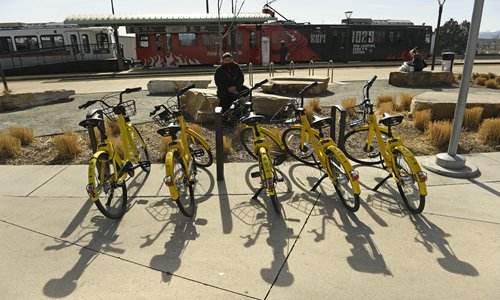Stricter regulations overseas limit Chinese services’ expansion
Beijing-based bike-sharing company ofo was reportedly drastically scaling down its overseas operations, retreating completely from Germany and Australia and reducing its presence in large markets such as the US and India, in a sign that new Chinese internet businesses are having trouble replicating their success abroad.

Yellow ofo bikes sit outside of a station in April 2018 in Denver, Colorado. (Photo: VCG)
Such businesses should consolidate in its best markets before rushing to go global, industry anaylysts said.
US media Quartz reported Wednesday that ofo has laid off employees across the board in North America.
The company has been expanding fast across more than 250 cities in 20 countries and regions, according to its official website.
Bike-sharing services, which have boomed in China in recent years, proved popular with some users abroad but reactions were also mixed, with many complaints about a lack of reliability, issues with vandalism and non-compliance with transport regulations.
"The bikes are convenient, and it's great to be able to leave them anywhere. But there are not many of them, and some roads aren't well adapted to riding bicycles," an ofo user in Spain told the Global Times. "Many bikes are also broken or vandalized, and it's very frustrating to find out a bike is broken and unusable when you were planning to use it," he noted.
Experts noted that ofo may have failed to account for differences in the regulatory environment when expanding abroad, as other cities, particularly in Western countries, tend to take a more strict approach to city planning, unlike Chinese cities which are more friendly to new commercial ventures.
"The Chinese and overseas environments for bike sharing are very different," Zhao Xiang, an analyst at Beijing-based research company Analysys, told the Global Times on Thursday.
"In China often businesses are first allowed to operate, and later the government steps in to regulate them. In foreign countries they tend to have strict regulations early on, which makes it hard to expand the service," she said.
Regulations on the number of bicycles allowed in a city and places where they can be parked have reduced some of the convenience of bike-sharing in some countries, which also affects the profitability of the service, noted Gu Dasong, an associate professor of transport laws at Southeast University.
"Beijing alone has more than 2 million bikes, and Shanghai more than 1 million, while some European cities will only allow a few hundred. That defeats the whole purpose of a service that relies heavily on economies of scale, as a big part of the appeal of shared bikes is that they are easily accessible. Bike-sharing companies would do well to focus on larger and more dense cities for the time being," said Gu.
Experts noted that the retreat from overseas will likely be temporary as the industry reaches maturity.
"Bike-sharing is actually quite capital-intensive, as it needs people on the ground to replace and repair the equipment. The domestic market is also seeing consolidation as many companies experience liquidity problems," said Zhao.
"Mobike has been more cautious in its expansion, but ofo expanded too fast without a clear strategy, so now it must retreat and consolidate in its best markets before it comes out again."
Ofo did not respond to requests for comment by the Global Times on Thursday.


